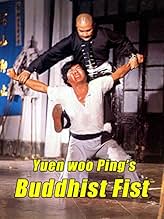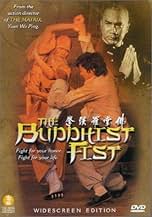Agrega una trama en tu idiomaAspiring barber and experienced kung-fu fighter Shang learns that his childhood friend, Siu Ming, has been framed for murder by an unknown villain. When Shang begins looking into the crime, ... Leer todoAspiring barber and experienced kung-fu fighter Shang learns that his childhood friend, Siu Ming, has been framed for murder by an unknown villain. When Shang begins looking into the crime, he soon finds himself the target of an assassination attempt. Who is behind all these crim... Leer todoAspiring barber and experienced kung-fu fighter Shang learns that his childhood friend, Siu Ming, has been framed for murder by an unknown villain. When Shang begins looking into the crime, he soon finds himself the target of an assassination attempt. Who is behind all these crimes, and can Shang stop them?
- Dirección
- Guionistas
- Elenco
- Shang
- (as Yuen Shun I)
- Chen
- (as Lee Hoi Sung)
- Fat Master
- (as Fan Mui Shung)
- Fortune Teller
- (as Dai Sai Ngan)
- Dirección
- Guionistas
- Todo el elenco y el equipo
- Producción, taquilla y más en IMDbPro
Opiniones destacadas
Yuen Woo-Ping's "Buddhist Fist is probably his masterwork of the "old School" Hong Kong action film era, but it may also be his finest dramatic achievement in any era. Without spoiling the film, I warn the reader that the film hinges on a cultural anomaly; it is possible in the East to be committed to a Buddhist monastery as a child without having spiritually converted to it. This means pretty much in the East what it once did in the West, when Roman monasticism was at its height: repression, rage, hypocrisy. These are clearly not vices Westerners like to associate with Buddhism, and they aren't particularly admitted in the East, either. Consequently, for Yuen Woo Ping to make this the core issue of this drama took considerable courage on his part, and it shows forth in the dedicated acting of its leading performers.
There are weak points to the film, to be sure: Yuen's father, Simon Yuen, of "Drunken Master" fame, died during the making of the film (as apparently he did during the making of at least a half-dozen others!), and a beefy part for him had to be trimmed and rewritten for completion by someone else; this also weakens some of the oddball humor that some viewers find annoying about the film, but which, taken on its own terms, is quite enjoyable. (I suppose one really has to have a grasp on Cantonese theatrical traditions to appreciate this.) But the core drama of the film, despite all the stereotypes en-framing it, remains strong after more than twenty years, because of the myriad conflicting human emotions it evokes.
Oh, and of course, the martial arts happen to be absolutely exquisite in choreography and performance.
But it is the drama that finally preserves this film - and I expect it will do so for another generation or two.




















